Ultimate marketing automation platform comparison & vendor list
Marketing automation platforms offer numerous benefits by streamlining manual B2B marketing tasks, including lead management, email campaign development and landing page creation.
With martech budgets under greater scrutiny in the current environment, marketing leaders are expected to be able to demonstrate ROI for any new technology investment. Marketing automation platforms are a critical part of the martech ecosystem for many businesses, offering numerous benefits by streamlining manual B2B marketing tasks, including lead management, email campaign development and landing page creation.
Below you will find a list of 16 notable marketing automation vendors that we profiled in recent MarTech Intelligence Reports on B2B marketing automation platforms.
These platforms offer a wide range of advanced features, including AI-based predictive lead scoring and product recommendations, ABM and social media campaign integration. They also integrate seamlessly with many third-party CRM and other point solutions to offer extended capabilities. The key to ensuring ROI is to make sure the platform is easy to use and scale and is suited to your organization’s goals. Platform vendors offer extensive training programs, online communities and strategic consulting services to encourage more comprehensive platform use and create a higher return on marketing automation investments.
Here is our list, which is organized alphabetically and not in any order of importance. For information on pricing and a deeper feature breakdown on several of these platforms, download the MarTech Intelligence Report.
Acoustic
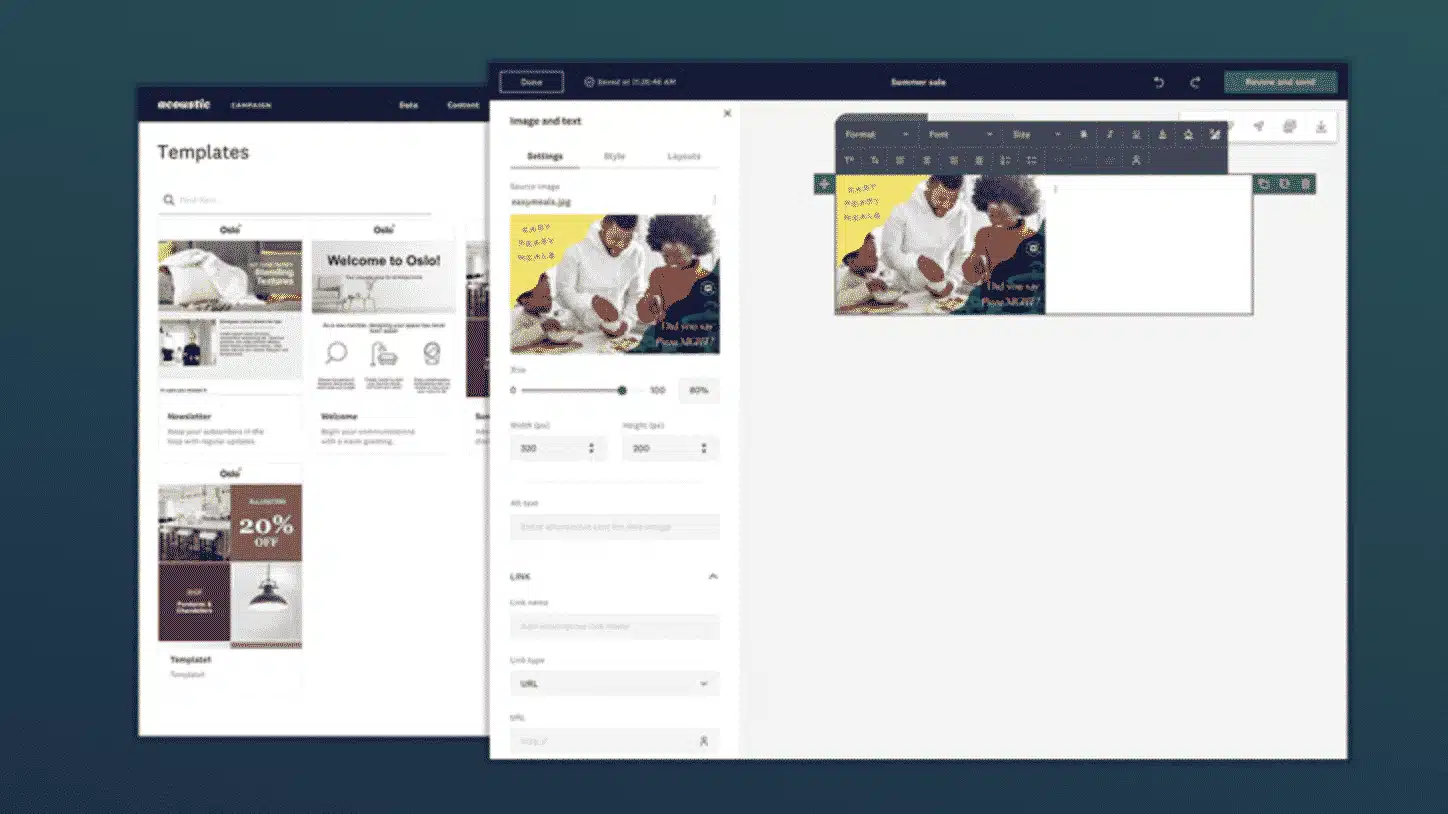
Founded in 2019 after IBM Watson Marketing separated from IBM as a standalone company, Acoustic powers thousands of marketing teams in more than 70 countries, sending more than 4 billion messages every week. It is currently backed by Centerbridge Partners and employs 900 people.
Target customers
B2B and B2C upper mid-market and enterprise marketing teams, supporting retailers, banks, insurance, ecommerce, education, travel, hospitality, media, manufacturing and entertainment. Some key customers are Cuisinart, Harlequin, PayPal, Republic Services, USO and Wiley.
Product overview
The company’s Acoustic Campaign platform offers the following capabilities:
- Drag-and-drop composing experience enables marketers of all levels to build emails without writing a single line of code.
- Automated journey programs enables marketers to execute at scale automated, multi-step campaigns across the entire customer journey (email, SMS, mobile push, social, web).
- Lead capture, nurturing and scoring models deliver high-quality leads while decreasing customer acquisition costs.
- Built-in Litmus integration enables marketers with a Litmus account to preview different email clients, including Gmail, Outlook, and iPhone and Android platforms, and receives reports such as geo-location (including city, state, and country), and average engagement time and preferred email client or device.
- Inbox Monitoring helps clients ensure maximum deliverability to Inboxes across providers and, thus, engagement.
- Mobile app messaging campaigns capture mobile insights in real-time and drive personalized mobile experiences (push notifications and in-app messages) to each contact.
- SMS campaigns reach customers quickly with personalized, targeted messages.
- Social campaigns enable marketers to reach existing segments in social channels or to expand to reach new contacts that resemble existing profiles.
- Dynamic content makes it easier for marketers to highly personalize content and messages based on customer preferences.
- Budgeting and planning leverage marketing, CRM and finance systems to measure, track and optimize marketing performance.
Artificial intelligence is used throughout the Acoustic Marketing Cloud. Here are a few ways AI is leveraged in the platform:
- Acoustic Campaign saves marketers time and helps them be alerted of any unexpected changes in email metrics with anomaly detection for emails in a journey program.
- Seamless content management with automatic application of metadata tags to digital marketing assets.
- Anomaly and struggle detection to optimize the customer experience across digital channels like websites, landing pages, and mobile apps.
- Preferred location feature allows marketers to leverage AI-determined personal locations (such as “home” and “work”) to communicate personalized messages and offers while maintaining customer privacy.
- Predictive weather events uses large datasets to build relative triggers that can personalize customer engagements.
Acoustic also powers digital experiences through a built-in headless CMS. Here are those features:
- Marketers use the CMS to build landing pages, lead capture forms, and campaigns.
- The CMS is linked to Marketing Automation, so updates are synced across channels.
- All content leverages the built-in personalization engine to tailor content and offers to individual customers.
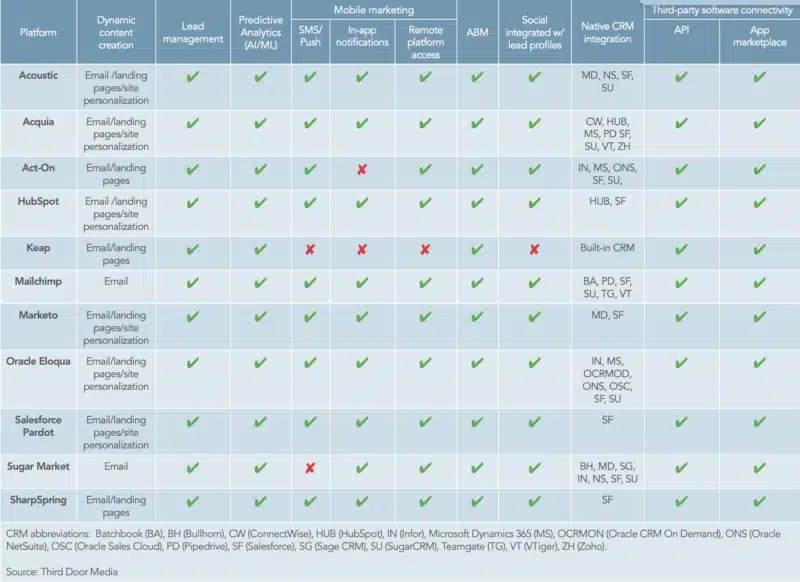
Explore marketing automation solutions from vendors like Marketo, HubSpot, Salesforce and more in the full MarTech Intelligence Report on marketing automation platforms.
Acquia Campaign Studio
Boston-based Acquia, perhaps known best for its Drupal content management system, was founded in 2007 and was acquired by Vista Equity Partners in September 2019. I has 1,400 employees across several major global cities. Acquia made three acquisitions in 2019: Mautic (May), Cohesion (September) and AgilOne (December). Acquia acquired Widen in September 2021.
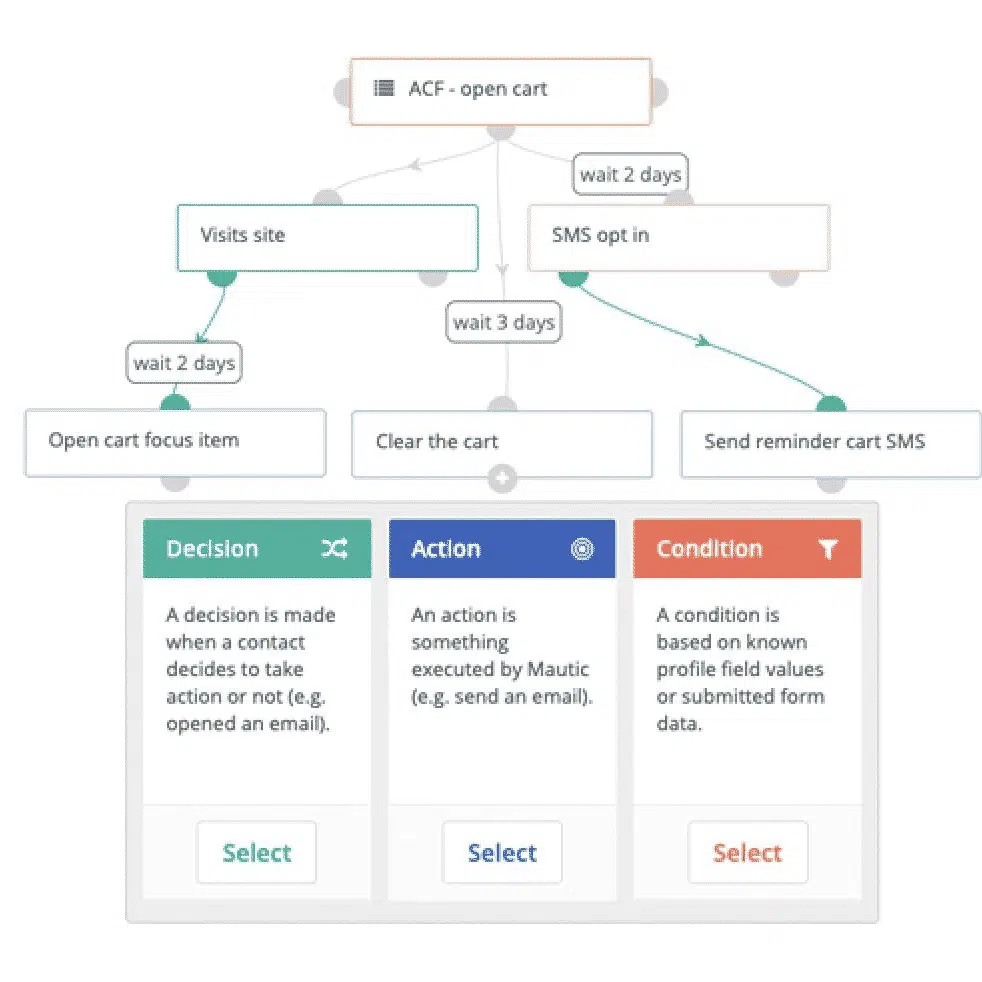
Target customers
Acquia targets mid-market and enterprise businesses, and several of its most notable marketing automation customers are Shake Shack, Lids, ParkNow and Applause.
Product overview
- Acquia Campaign Studio (formerly Mautic, which it bought in 2019) is a customer journey orchestration solution that allows brands to align their digital strategies, create, orchestrate and deliver exceptional customer experiences across all channels.
- Offers a drag-and-drop interface that allows marketers to orchestrate the customer journey by defining different journeys that respond to what customers are doing in real-time. This includes cross-channel, multi-touch and multi-wave campaigns.
- Marketers can build individually personalized content quickly through a drag-and-drop Email Builder, from scratch or from a template, execute and monitor all aspects of their campaign directly; helping boost engagement, loyalty and customer lifetime value.
- With Acquia Campaign Studio, organizations can onboard any channel and orchestrate seamless, one-to-one customer experiences everywhere. This includes email, SMS, push notifications, landing pages, web push and personalization, social media, ad tech, direct mail, and emerging channels like voice, IoT and digital signage.
ActiveCampaign

Chicago-based ActiveCampaign was founded in 2003 and employs more than 1,000 people. It has secured $360 million in three rounds of venture capital funding, including $240 million in April 2020. ActiveCampaign has customers in 170 countries worldwide.
Target customers
ActiveCampaign serves SMBs to enterprises in all industries across B2B, B2C and ecommerce. Key customers include Hipcooks, Iconosquare, Koia, McCrindle, Party Headphones and Thinkific.
Product overview
ActiveCampaign’s Customer Experience Automation (CXA) platform provides businesses of all sizes access to 600+ pre-built automations that combine email marketing, marketing automation, CRM, and machine learning for powerful segmentation and personalization across social, email, messaging, chat, and text. Also, over 70% of ActiveCampaign’s customers use its 870+ integrations including Shopify, Square, Facebook, Eventbrite, WordPress, and Salesforce.
Its CXA platform removes the barriers created by legacy email, marketing automation, CRM, and service and support solutions and helps businesses deliver a connected customer experience without forcing them into an all-in-one marketing solution.
Businesses can use ActiveCampaign to orchestrate personalized automations across their technology stack for omnichannel engagement.
Use cases focus on marketing and sales teams leveraging the platform across the customer lifecycle to improve communication strategies, including:
- Removing customers from a promotional campaign if there is an open ticket.
- Passing automatically qualified leads over to the sales team, nurturing leads/customers via branching, dynamic email flows depending on their demographic data.
- Sending customers an email that contains product information pertinent to each customer based on their previous purchases.
- Connecting the CRM to the rest of the business then leveraging customer data from marketing and success interactions to automate personalized nurture emails, SMS messages, and chats through channels like Conversations or WhatsApp.
- Automating repetitive tasks like moving a lead through a pipeline, adding tags based on their responsiveness, or passing deals to a manager when help is needed.
Act-On Software

Portland-based Act-On considers itself the only independent and marketing-focused automation vendor in the market. Founded in 2008, Act-on currently employs 200 people across its Portland and Reading, U.K. offices. It has raised a total of $74M in venture funding.
Target customers
Emerging growth and mid-market B2B and B2C companies seeking a highly configurable and powerful marketing automation platform, growth marketers looking to extend marketing performance across customer experiences, and buyers in a variety of industries that include business and financial services, manufacturing, higher education, insurance and technology. Key customers include RLH, Sharp, RSA Canada, Avery Dennison, Simpleview and Oregon State University.
Product overview
- Offers a highly configurable platform that sets users up for success and adapts as their business needs evolve.
- Delivers intuitive inbound and outbound multichannel marketing, contact capture, scoring, segmentation, targeting and lead nurturing.
- Open ecosystem for simple integration of the technology stack, with native CRM integrations for Salesforce, Microsoft Dynamics, Sugar CRM, and NetSuite.
- Designed to empower growth marketers to deliver consistent customer experiences, drive product adoption and advocacy.
- Act-On also says its customers enjoy the best email deliverability rates in the industry. It also offers deep integrations with event planning solutions and SMS messaging directly from within the product.
Dotdigital

Founded in 1999, London-based dotdigital began as a digital agency and has evolved to serve marketing and communications professionals with its Engagement Cloud. It is a public company traded on the London StockExchange and employs 350 people across several global headquarters.
Target customers
Dotdigital works with customers ranging from SMBs to mid-market companies to enterprises. Some key clients include British Airways, USA Rugby, Copa Air, Surf Outfitter, Bearpaw and Monin.
Product overview
- Users can import data, build segments and triggers, and create relevant marketing campaigns that engage customers on their favorite channels. In addition to email marketing, dotdigital supports the personalization of marketing messages across SMS, push notifications, live chat and social ads.
- Users of the platform can use contact/lead scoring capabilities to score leads based on a range of data points and actions.
- Integrations with the likes of Microsoft Dynamics 365 and Salesforce ensure that newly acquired contacts are synced with CRM platforms.
- ABM activities can be automated with dotdigital’s program builder. With it, marketers can orchestrate end-to-end nurture campaigns and, for example, add contacts who meet a particular lead score as they engage with marketing communications to an address book of sales-ready leads.
HubSpot
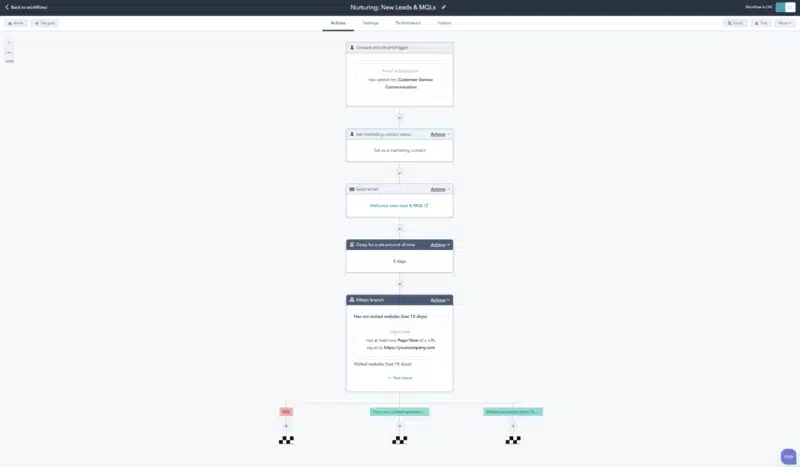
Founded in 2006, Cambridge-based HubSpot is perhaps best known for its customer relationship management (CRM), but its software services have grown well beyond CRM. The company has 4,000 employees, is publicly traded on the New York Stock Exchange and has offices across the world.
Target customers
HubSpot serves B2B and B2C customers, mostly mid-market and scaling SMBs. However, the company is more recently serving enterprise businesses. Some key clients include SurveyMonkey, Classpass, DoorDash, Airstream, Care.com and Randstad.
Product overview
The HubSpot Growth Platform is a full software stack for marketing, sales and customer success, with a free CRM at its core. The platform components are:
- HubSpot Marketing Hub: Includes tools for lead capture and management, scoring, nurturing, analytics, A/B testing, blogging, content management, social monitoring and publishing, email marketing and paid advertising. Offers rules-based or predictive lead scoring for any data point including email and website actions, social media metrics and form captures. Scoring systems can be tested as well as segmented in a customer’s database. Additional functionality includes the ability to trigger campaigns, profile and lead scoring changes, and notifications when particular prospect behaviors occur.
- HubSpot Sales Hub: Sales productivity software for sales teams at growing businesses. The software includes email tracking from the user’s inbox, notifications when leads view site pages, and in-line information on competitor sites and emails users receive. Can be used to schedule emails and follow-ups from within the user’s inbox.
- HubSpot Service Hub: A service tool for growing businesses that want to prioritize the needs of the customer. Tools include a unified inbox called Conversations, knowledge base tools, and customer feedback measures.
- HubSpot CRM: A CRM and growth tool for businesses that are just starting to formalize their sales process. Helps align sales teams and supports business growth by organizing details about an organization’s contacts, companies, sales process and customers in one place.
- HubSpot CMS: Uses a personalization engine to customize the website experience for each visitor. Includes free one-click SSL, as well as a web application firewall for added security.
Keap
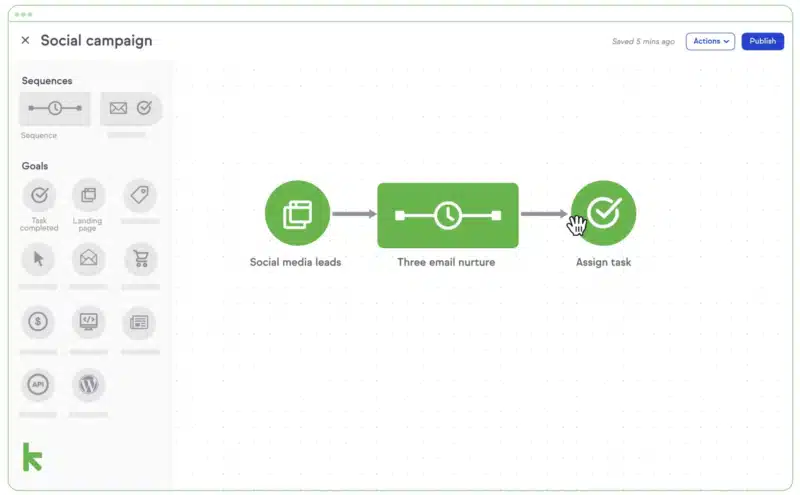
Chandler, Arizona-based Keap was founded in 2001 and has 400 employees. Its investors include Bain Capital Ventures, Goldman Sachs, Signal Peak Ventures, and Mohr Davidow Ventures
Target customers
Keap primarily serves small businesses with two to 25 employees. Key clients include The Bestseller Academy, Skillastics, Artist Management Services, Magic Evan, Brooklyn Music Factory and Advocates 4 Angels.
Product overview
- Keep centralizes customer information in a suite of tools including CRM, sales automation, marketing automation, ecommerce, payments, analytics and mobile solutions.
- Marketing automation tools that offer contact management, contact segmentation (tags), saved searches, tasks, Web forms, landing pages, company records, lead scoring, customizable dashboard, pipeline management, advanced automation, or an easy automation builder.
- Keap also supports Automated list management for email engagement monitoring and data migration services.
Mailchimp
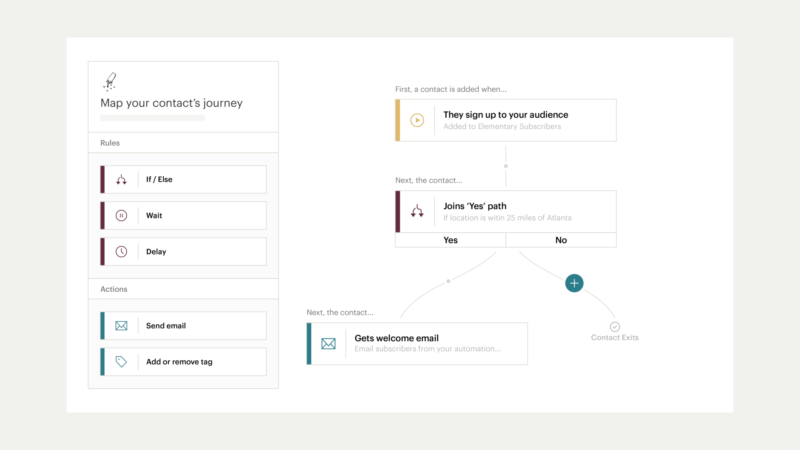
Founded in 2001, privately owned Mailchimp has 1,200 employees. Headquarted in Atlanta, Mailchimp has additional offices in Brooklyn, Oakland, California, Santa Monica, California and Vancouver, Canada.
Target customers
The company says it targets Fortune 100 companies, though most customers are small businesses, particularly in the commerce and technology industries. Key clients include Dollar Shave Club, GitHub, Magnolia Market, Chronicle Books, TEDTalks and UrbanSitter.
Product overview
- Mailchimp provides marketing tools for email, Facebook ads, Instagram ads, landing pages, Google remarketing ads, sign-up forms, postcards, customer relationship management, websites and organic social posting.
- When it comes to lead generation and analytics, the platform includes behavioral targeting, segmentation, predicted demographics, tags and contact profiles, a lookalike audience finder, lead management and an audience dashboard.
- Integrations give users the option to connect the collaboration and task management tools of their choice to the Mailchimp account.
Adobe Marketo

Marketo was acquired by San Jose-based Adobe in October 2018. Its parent company Adobe was founded in 1982. It has 22,634 employees and more than 13,000 customers around the world.
Target customers
Marketo Engage is designed for SMB to enterprise-level B2B marketers and some B2C considered-purchase marketers in a variety of industries, including technology, business services, healthcare, financial services, education, manufacturing, and telco. Key clients include CenturyLink, Charles Schwab, GE Panasonic, RingCentral and Roche.
Product overview
Cloud-based Marketo Engage features 10 major capabilities for:
- Marketing automation to create, automate, and measure campaigns across channels.
- Account insights and profiling to identify the right target accounts using data and AI.
- Email to engage customers with relevant conversations in minutes.
- Mobile to communicate with customers using mobile devices.
- Social integration to identify potential and current customers.
- Targeted, personalized display ads.
- Dynamic interactions with customers on a web site.
- Marketing analytics to prove and improve business impact.
- Predictive content.
- Marketo Sales Connect to coordinate sales and marketing.
Marketo Engage natively performs basic data cleansing.
- Data deduplication feature finds and merges duplicate users in the database.
- Users can set up automated workflows for data normalization.
- More advanced data deduplication and data cleansing enabled through turnkey integrations with a number of LaunchPoint partners, including RingLead, ReachForce, StrikeIron, and CRMFusion.
Account-Based Marketing offers unified lead and account-based strategies.
- Account Smart Lists leverage AI and predictive scoring reveal best-fit accounts for campaign activation.
- Personalized experiences are automated across accounts with intelligent account nurturing.
- Account-based insights delivered to sales offering full visibility across the buying team.
Sales Partnership shares customer intelligence across every touch of the buyer journey.
- Multi-attribute lead scoring across sales and marketing touches.
- Real-time data capture and bi-directional data integration sync with CRM.
- Power multiple sales engagement capabilities and digital sales playbooks.
- Prioritized lead and account engagement scores.
- Supported sales engagements and channels include email, phone, sales and marketing nurture campaigns, preloaded email templates, suggested email categories, cross-channel personalization.
- Individual and team performance data.
Maropost
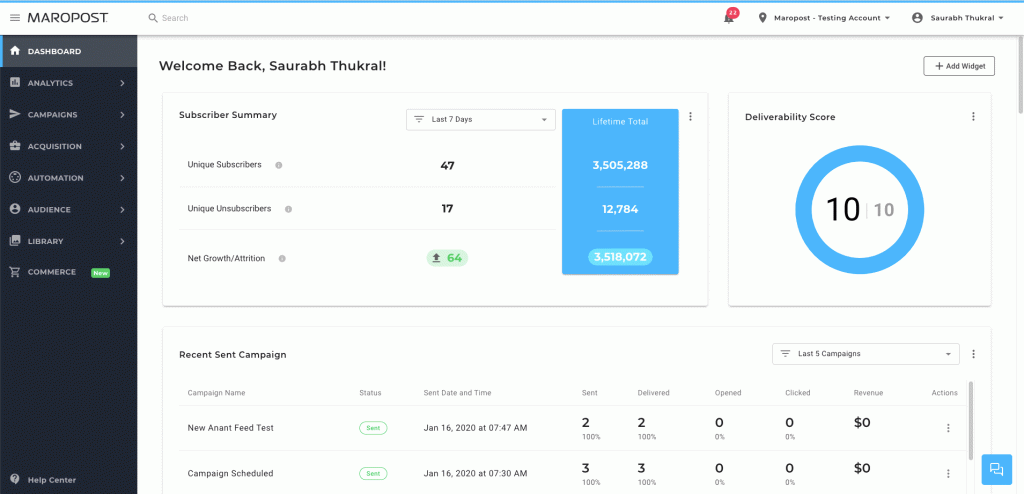
Toronto-based Maropost was founded in 2011 and has more than 270 Employees. It acquired ecommerce platform Neto in March 2021 for more than $60 million and subsequently rebranded the platform Maropost Commerce Cloud.
Target customers
Maropost serves Small- to medium-sized ecommerce companies seeking to automate their marketing and ecommerce functions. Key customers include BioTRUST, Haymarket Media Group, Leaf Group and Shop.com.
Product overview
Maropost is a multichannel engagement platform designed to assist marketers in segmenting their audiences, personalizing their messages, and ensuring email delivery to inboxes.
Users can develop and schedule dynamic content based on unified customer data.
Cloud-based, marketing automation capabilities are optimized to support retention-based marketing strategies. The platform also enables personalized web experiences, data-driven emails, simplified mobile interactions, and social campaign alignment.
Also, automated product features allow marketers to focus on more strategic needs.
Oracle Eloqua
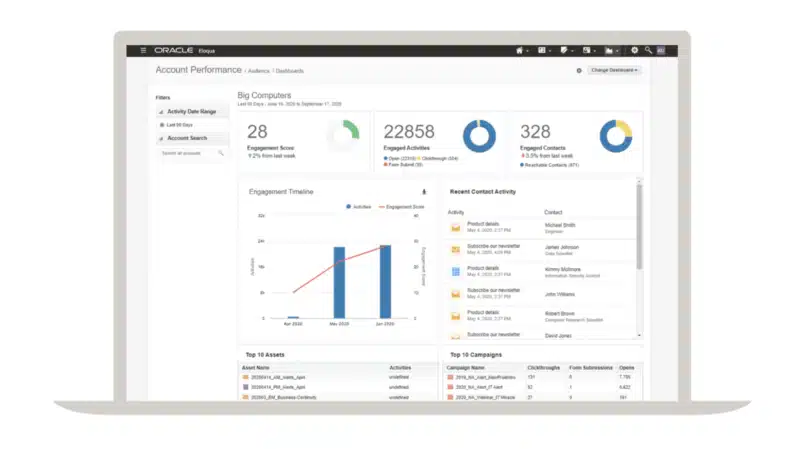
Austin-based Oracle was founded in 1977 and it acquired Eloqua in December 2012 The company, which trades publicly on the New York Stock Exchange, has 135,000 employees and offers suites of integrated applications plus infrastructure through its Oracle Cloud offering.
Target customers
Oracle Eloqua is marketed to:
- B2B or B2B2C organizations that are enterprise, mid-market or small businesses that require nurturing / lead scoring for large considered purchases or long sales cycles.
- Sales and/or marketing departments who are looking to align internally and personalize the digital customer experience.
- Industries include, but are not limited to: High tech, manufacturing, financial services and insurance, travel and transportation, consumer packaged goods, and media and communication.
Key clients include DocuSign, Panasonic, Mack Trucks, Movember, Kansas City Chiefs and the Tampa Bay Lightning.
Product overview
Oracle Eloqua is a marketing automation solution for cross-channel campaign orchestration that nurtures leads across each stage of the buying process using bestin-class applications to drive sales with:
- Campaign orchestration to create dynamic campaigns that intrigue buyers and adapt the multi-touch experience based on a buyer’s real-time activities.
- Targeting and segmentation capabilities that allow users to create rich customer profiles and target the right individuals with the most relevant information throughout the sales cycle.
- Lead management capabilities that are customizable and leverage key data points while driving high-quality leads.
- Sales and marketing alignment with unified buyer intelligence to identify, prioritize, and track high-valued opportunities and top-tier accounts across the sales cycle.
- Data management and activation that allow marketers to take the next best action with a contact based on real-time digital behaviors.
- Asset management for design and re-purposing compelling emails, landing pages and content blocks that engage customers and efficiently manage assets across teams and campaigns.
- Marketing measurement and insights through flexible and powerful out-of-thebox reporting and detailed dashboards.
- Advanced intelligence capabilities that apply data science to observed behaviors and adapt experiences to the learned preferences of each individual.
Oracle Eloqua’s data management capabilities allow for data deduplication, normalization, and augmentation to keep data clean and updated. Eloqua enables integration with dozens of third parties to complete account and contact data ensuring it’s up to date in the system.
Salesforce Pardot
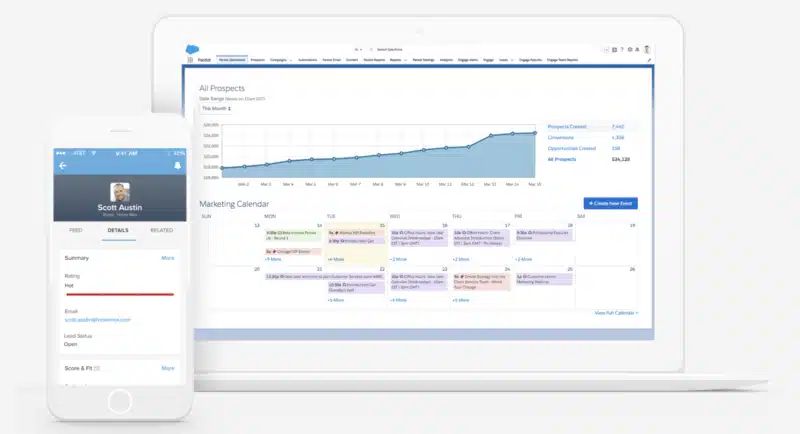
San Francisco-based Salesforce was founded in 2007 but it purchased Pardot in 2013. It has offices in more than 30 countries.
Target customers
Salesforce serves
High-growth companies to enterprise-level organizations across all industries, market segments, and geographies. Key customers include Emerald, McAfee, NBC Universal, Sika, Valpa and Wartsila.
Product overview
Salesforce Pardot aligns marketing and sales teams to generate more pipeline, empower sales to close more deals and grow customer relationships at scale. Key components include Marketing Analytics to help marketers understand and improve marketing ROI, Artificial Intelligence to unlock the next level of productivity and effectiveness, and account-based Marketing (ABM) to target and grow key accounts.
Built on the Salesforce Customer 360 platform, organizations are provided with the key ingredients to drive demand. The seamless integration and visibility of data enriched by AI across marketing and sales create a frictionless customer experience between digital and human touchpoints.
Primary use cases focus on:
- Demand generation campaigns and journeys.
- Lead management.
- Account-based marketing.
- Lifecycle Marketing (upsell/cross-sell).
- Account relationship building and management.
- Adoption marketing.
- Marketing, sales, and service alignment.
- Sales alerts.
- Marketing content and campaigns for sales.
- Sales insights and analytics.
- B2B marketing analytics and attribution.
SharpSpring

Gainesville, Florida-based SharpSpring was founded in 2012 and has about 230 employees. In 2019 it acquired Perfect Audience, a digital advertising platform. SharpSpring was acquired by Constant Contact in October 2021. Constant Contact is headquartered in Waltham, Massachussetts.
Target customers
SharpSpring caters to SMBs and marketing agencies, including digital marketing, advertising, web design and public relations firms. Top verticals include creative, technology, professional/financial services, legal, manufacturing, healthcare, education and travel/hospitality. Key clients include Cleartail Marketing, Core Integrated Marketing, Funnelbud, mXtr Automation, Phobos & Actor and Ulistic.
Product overview
A cloud-based sales and marketing revenue growth platform built for marketing agencies and small to mid-sized businesses. The platform provides a comprehensive suite of tools that allow users to track the complete buyer’s journey with end-to-end ROI, while delivering targeted communication at critical conversion points along the way.
Provides comprehensive solutions for sales and marketing teams of any size.
Feature highlights include:
- CRM: Contact Manager, Opportunities, Pipelines.
- Life of the Lead: A historical record of each contact’s engagement with the brand, from first site visit to every form-fill and beyond.
- Contact Record: SharpSpring’s contact record gives a comprehensive “work station” to empower users to log notes, launch and log phone calls, launch emails, update/store contact information, review campaign membership, list membership, historical engagements in a linear format (Life of the Lead), etc.
- Multiple device tracking: Monitor lead behavior across every known mobile, tablet and desktop device.
Sugar Market
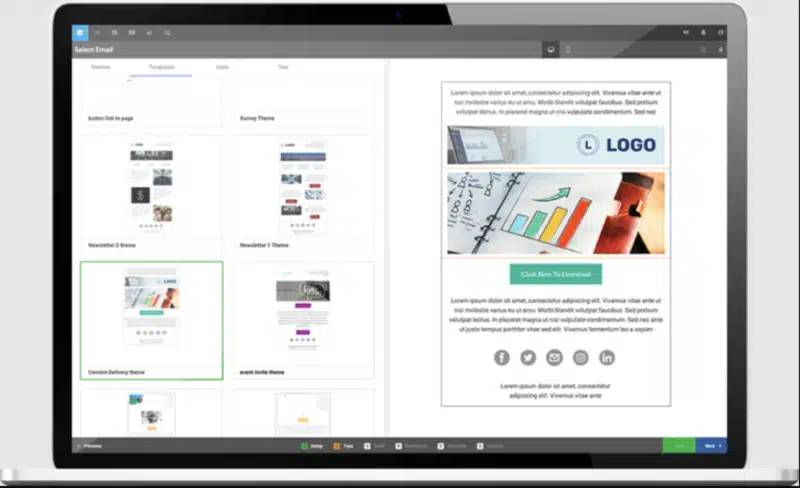
Cupertino, California-based SugarCRM was founded in 2004. SugarCRM acquired Salesfusion in May 2019 and rebranded that marketing automation platform as Sugar Market. Today it is a key pillar of the Sugar CX suite of products and services. SugarCRM has 500 Employees. SugarCRM acquired Node Inc. in August 2020 to gain predictive customer intelligence to democratize AI.
Target customers
Sugar Market is intended for small to medium-sized enterprises, typically with headcount between 100-2,500 full-time employees and a marketing organization of 5-15 people (maybe a division or region of a larger organization). It serves both B2B and B2C customers across a variety of industries with strong experience in software, manufacturing, professional and financial services, and recruitment. Key clients include Seco Tools, Moorepay, SiteLock, Ogilvy, The Home Store and The Adecco Group.
Product overview
Sugar Market is a multichannel marketing automation platform that allows users to connect and engage with customers wherever they happen to be.
Built-in inbound and outbound email marketing tools, social media management capabilities, AI-driven predictive analytics and lead scoring, and Google Ads management tools.
A cloud-based solution that is pre-integrated into nine leading sales automation solutions, including Sugar Sell, Sugar Enterprise and Sugar Professional.
Thryv
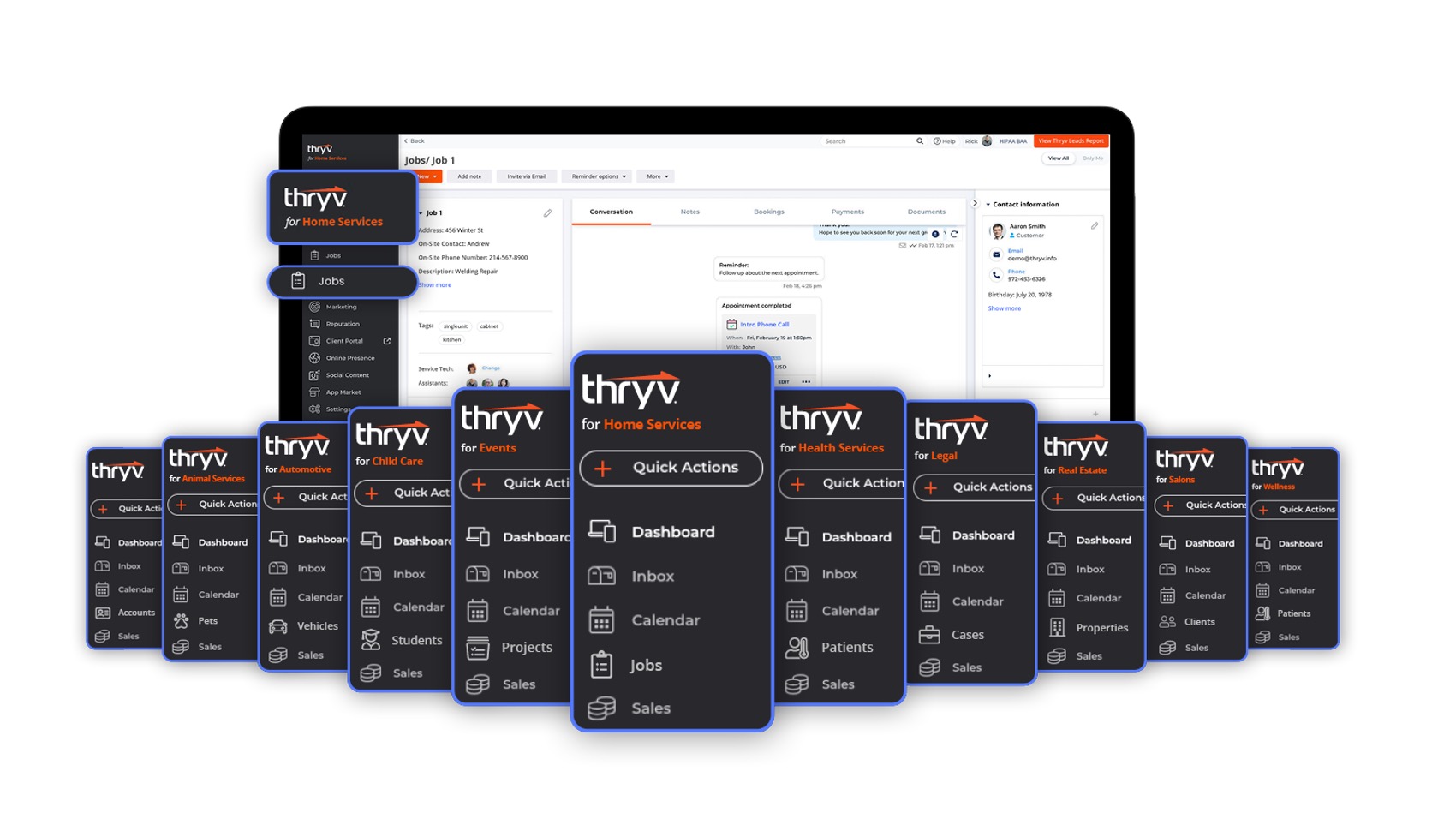
Dallas-based Thryv was founded in 2013 and has 2,400 employees. Thryv Holdings is publicly held, trading on the Nasdaq exchange under “THRY.” It acquired Melbourne, Australia-based Sensis in March 2021, which was then
rebranded as Thryv in September 2021.
Target customers
Thryv serves micro-businesses and SMBs in professional services verticals, including legal, business, wellness, physical fitness and pets.
Product overview
Thryv is a SaaS customer experience platform for growing small businesses and franchises that want to streamline all aspects of their day-to-day workflows.
Includes a CRM, centralized inbox, automated marketing, social media management, payment processing, document storage, client portal, online appointment scheduling, synced calendar, online presence and listings management, email and SMS marketing, Google My Business optimization and reputation management.
It launched ThryvPay in October 2020 to provide service-based businesses with payment processing services. The platform also allows users to accept payments via PayPal, Square and Stripe.
Unica

Unica is owned by Sunnydale, California-based HCL Technologies, which was founded in 1976 and has 155,000 employees today. The company acquired select IBM products for security, marketing, commerce, and digital solutions in June 2019. HCL took full ownership of the research and development, sales, marketing, delivery, and support for AppScan, BigFix, Commerce, Connections, Digital Experience (Portal and Content Manager), Notes Domino, and Unica.
Target customers
Unica serves enterprise and midsize companies in the banking, financial services, insurance, retail, healthcare, telco, and travel and hospitality markets.
Product overview
The HCL Software Unica Suite is an enterprise-class, integrated cloud-native marketing platform designed to deliver precision marketing at scale and help marketing strategists achieve goals around revenue targets, increased wallet share, customer loyalty and more.
With nine fully integrated key modules and in-built optimization, the platform provides marketing practitioners end to end marketing capabilities to engage and deliver highly personalized customer experience across a wide variety of outbound, inbound, social and adtech channels – direct mail, email, SMS, Push, WhatsApp, website, call center, IVR mobile, ATM, Kiosk, POS, LinkedIn, Google AdManager and Facebook. It simplifies the execution of complex marketing programs with a business-friendly UI/UX and seamlessly integrates with homegrown and third-party marketing technology applications.
Unica can be deployed through Docker framework or natively, on-premise or on any cloud of your choice. This marketing automation solution is highly scalable, robust and secure, while providing a single marketing system of record to implement omnichannel marketing strategies.
Use cases focus on:
- Customer experience orchestration.
- Automated outbound campaigns.
- Omnichannel personalization and optimization.
- Personalized targeting across dig
Marketing automation: A snapshot
Why we care.. For today’s marketers, automation platforms are often the center of the marketing stack. They aren’t shiny new technologies, but rather dependable stalwarts that marketers can rely upon to help them stand out in a crowded inbox and on the web amidst a deluge of content.
How they’ve changed. To help marketers win the attention battle, marketing automation vendors have expanded from dependence on static email campaigns to offering dynamic content deployment for email, landing pages, mobile and social. They’ve also incorporated features that rely on machine learning and artificial intelligence for functions such as lead scoring, in addition to investing in the user interface and scalability.
Dig deeper: What is marketing automation?
MarTech is owned by Semrush. We remain committed to providing high-quality coverage of marketing topics. Unless otherwise noted, this page’s content was written by either an employee or a paid contractor of Semrush Inc.
Related stories
New on MarTech